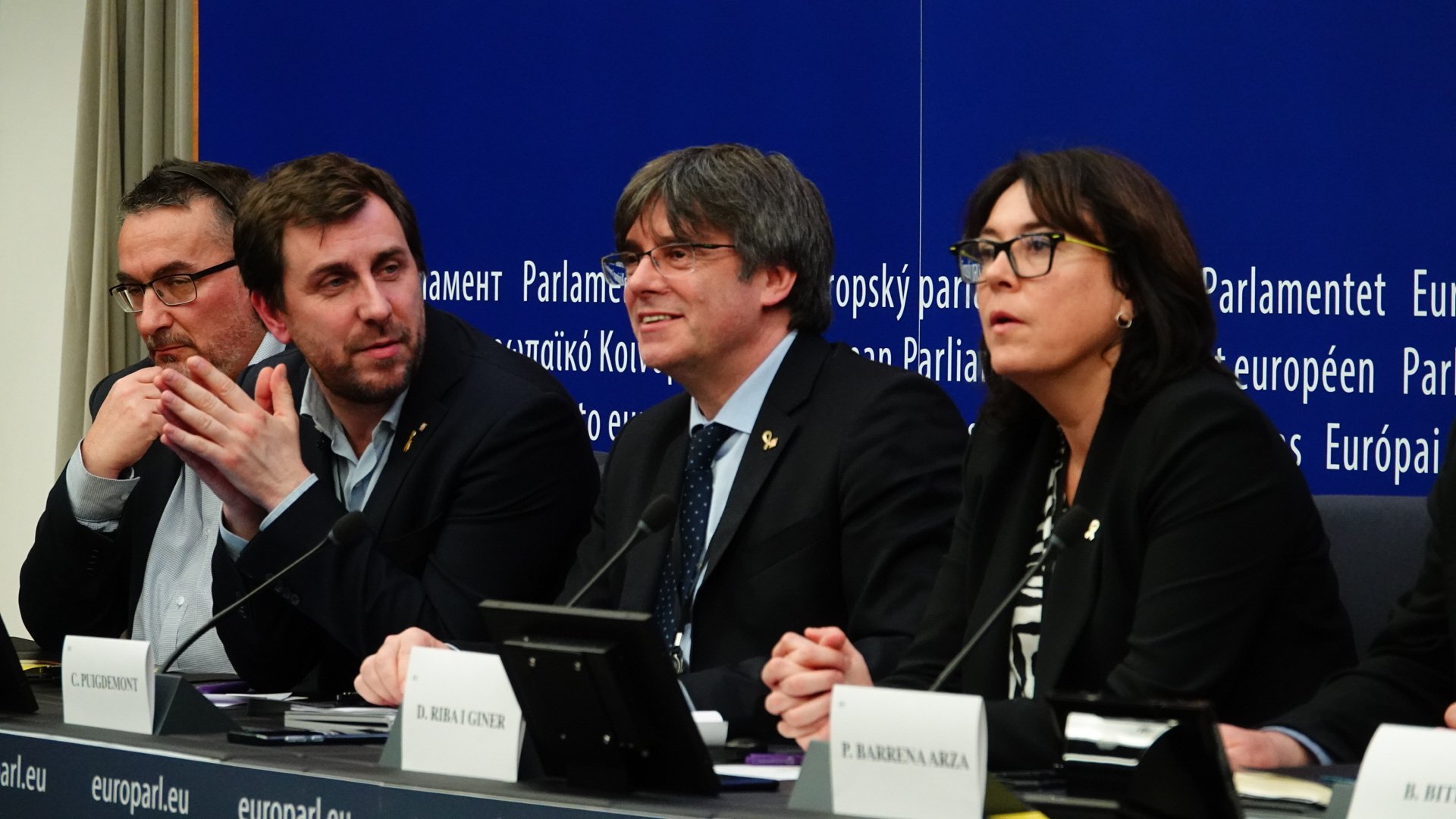The plenary session of the Spanish Constitutional Court will, this Tuesday, discuss the appeal lodged by Catalan MEPs Carles Puigdemont and Toni Comin against the decision of the Spain's Supreme Court on October 23rd, 2020, which backed judge Pablo Llarena in addressing himself to the European Parliament and asking it to lift the MEPs' immunity. In fact, it was last Friday, just as the European General Court (EGC) was analyzing whether the European chamber had acted correctly in accepting judge Llarena's request , that the Constitutional Court in Madrid announced that this point on the two pro-independence MEPs had been added to the agenda for this week. A coincidence? The judge spokesperson for the appeals against the resolutions 20/10/2020 and 28/12/2020 of the Supreme Court in the October 1st, 2017 case is judge María Luisa Balaguer, who has presented several minority opinions against the judgments on the Catalan independence leaders reached by the court presided over by Manuel Marchena. The excessiveness of the punishment, with jail sentences of up to 13 years, was one of her main criticisms. It is not known if this Tuesday itself the constitutional judges will release its decision, as it has been doing lately, before publishing the full details of the judgement later.
Specifically, the defence of Puigdemont and Toni Comín, carried out by lawyer Gonzalo Boye, asked the criminal chamber of the Supreme Court to annul judge Llarena's decision of March 4th, 2020, in which he dismissed the appeals against his decisions of January 10th, 2020, which, in turn, had resolved: to request the European Parliament to suspend the immunity of Puigdemont and Comín; to communicate to the European chamber that the two Junts politicians were being charged; to inform the European Parliament that the Spanish national warrants for the search for and arrest of Puigdemont and Comín remained in force, and finally to communicate to the Belgian authorities, where the procedure against Puigdemont is open, that it had requested the lifting of his immunity as an MEP, as well as that of former health minister Comín.
The question of the Supreme Court's competence
In his appeal to the Supreme Court, the lawyer of the two Junts MEPs recalled that they have had parliamentary immunity since, in December 2019, the European Court of Justice (ECJ) ruled that Oriol Junqueras had become an MEP at the time of being elected without any additional requirements ebing needed, such as swearing on the Constitution, and this recognition was extended to the MEPs of Junts. The immunity, as discussed at last week's EGC hearing, also allows Puigdemont and Comín to travel to and from meetings of the European Parliament.
Gonzalo Boye also argued that judge Llarena has no competence to investigate MEPs. In the Supreme Court's decision, the judge Vicente Magro, acting as chamber spokesperson maintained, in contrast with Boye's line, that the Spanish high court is indeed competent to analyze MEPs' cases, as established in jurisprudence, such as the resolutions dated 1991 and 2015. The lawyer had also argued that there was a lack of motivation offered for judge Llarena's initiative, which the court also rejected.
The third reason presented is that the actions for which judge Llarena seeks to put Puigdemont and Comín on trial "do not constitute any crime" - as established by the Schleswig-Holstein High Court in 2018 when it considered the actions for which Spain was trying to extradite Puigdemont from Germany - with the exception of a possible misuse of public funds. The chamber held that "a request for extradition must not be confused with the object of the investigation".
The political persecution that they denounce
As well, in the appeal which the Supreme Court rejected, the defence called for the immediate withdrawal of the European arrest warrant, after two earlier warrants had been dismissed in 2017. In addition, lawyer Boye argued that the suspension of parliamentary immunity is an attempt to unduly restrict the right to legal representation in relation to freedom of expression. The court analyzed the concept of fumus persecutionis ("appearance of persecution") and maintained that it did not fit this case, since Puigdemont and Comín were under criminal investigation before they were elected MEPs. A position identical to the one maintained by the European Parliament lawyer before the EGC last Friday, although he was questioned on the matter by the president in relation to the case of Elena Iontxeva. The Supreme Court had also dismissed that there was any violation of the right to presumption of innocence.
Could the Constitutional Court's ruling on Llarena's actions influence the General Court? One of the arguments of the European Parliament lawyer which the EGC has validated so far, in relation to Puigdemont, Comín and Clara Ponsatí, is that they respected the resolutions of the Spanish authorities. However, in the case of the Catalan pro-independence politicians, the EGC has been corrected several times by the ECJ, which is its direct superior court. And, for this reason, it is expected that the General Court will wait for the judgment from the Court of Justice on the preliminary questions presented to it by judge Llarena.
And despite the fact that politics takes its own parallel path, it is most likely that the president of the European Parliament, Roberta Metsola, will not rush to withdraw the MEP status from the Catalans, as the Spanish press claimed she had decided, before knowing the opinion of the Court of Justice, quite apart from the report of the European chamber's legal services. The judgment of the ECJ is expected for this December.

